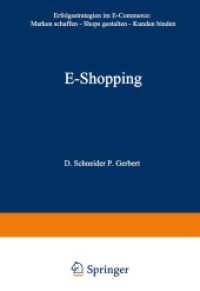Full Description
Across many countries, national, federal and district level governments are increasingly pursuing approaches to school improvement that seek to achieve so-called 'bottom-up' change. That is, improvements to teaching and learning that are generated by teachers, and subsequently shared horizontally and vertically within educational systems. Often such change relies on educators engaging in 'evidence-informed practice': improvements to teaching in learning that are grounded in data and research.
Within this context, this handbook examines how to bring about more consistent, evidence-informed practice in education globally. To do so, chapter authors have employed Hood's (1998) social regulation/cohesion matrix, combined with an institutional theory analytic lens, to provide detail on their specific contexts, including perspectives from every continent. Insights are subsequently analysed comparatively to provide generalisable insights that can be applied to any country, across the globe.
Generating understanding into how to more routinely foster evidence-informed teaching practice globally, this ground-breaking handbook is vital reading for educational researchers, and especially those working close to practice, in all settings. It is hoped that there are also lessons from education that can be applied to other areas such as social care, justice or health.
Contents
Introduction: What can be learned from international contexts about how to foster evidence-informed practice?; Chris Brown and Joel R. Malin
Part 1. Hierarchist Systems
Chapter 1. Evidence-Based Practices in U.S. Schools: The California Context; Elizabeth Zumpe
Chapter 2. Teachers' Use of Evidence to Inform Practice: Examining Cohesion, Regulation, and Accountability in California; Amanda Datnow, Hayley Weddle, and Marie Lockton
Chapter 3. Navigating Between Cohesion and Bureaucracy: The Catalan Way of Evidence-Informed Educational Practice; Georgeta Ion, Cecilia Inés Suárez, and Anna DíazVicario
Chapter 4. Evidence-Informed Teaching In England; Mike Coldwell
Chapter 5. Evidence-Informed Practice in the Context of the Republic of Ireland; Gavin Murphy and Martin Brown
Chapter 6. Multi-Stakeholder Networks and Evidence-Informed Practice in Education: A Case From Ontario; Stephen MacGregor and Amanda Cooper
Chapter 7. The Hierarchist Way of School Development in Sweden; Ulf Blossing
Chapter 8. Evidence-Informed Teaching Practice in the United Arab Emirates; Tasneem Amatullah and David R. Litz
Part 2. Fatalist Systems
Chapter 9. Evidence-Informed Practice in Australian Education; Joanne Gleeson, Mark Rickinson, Lucas Walsh, Mandy Salisbury, and Connie Cirkony
Chapter 10. Collaboratively Navigating a Competitive System: A Systematic Literature Review of Teachers' Evidence Use in Chile; Mauricio Pino-Yancovic and Álvaro González
Chapter 11. Evidence-Informed Practice of Standardized Assessments: The Case of Chile; Lucas Silva, Johana Contreras, and Jorge Manzi
Chapter 12. Evidence-Informed Practice in Denmark; Lars Qvortrup
Chapter 13. The Engagement of Teachers and School Leaders with Data, Evidence and Research in Germany; Jana Groß Ophoff and Colin Cramer
Chapter 14. Evidence-Informed Practice in Massachusetts (USA): A Systems-Level Analysis; Joel R. Malin and Kendra Winner
Chapter 15. Teacher Accreditation in New South Wales, Australia: The Cave of Wonders for Evidence-Informed Practice; Alexandra Harper
Chapter 16. Evidence-Informed Practice in South African Schools: An Examination of Enabling and Constraining Factors; Robyn Whittaker, Kathija Yassim, and Latoya Njokwe
Part 3. Individualist Systems
Chapter 17. Drivers and Obstacles for Evidence-Informed Practice in an Autonomous and Decentralized Educational System: Belgium; Kristin Vanlommel
Chapter 18. Teaching and Learning in Hong Kong Higher Education; Ka Ho Mok and Weiyan Xiong
Chapter 19. Evidence-Informed Practice in Italian Education; Monica E. Mincu and Sara Romiti
Chapter 20. Switzerland the Individualist - A Classification with Some Colorings; Enikö Zala-Mezö and Egli Johanna
Part 4. Egalitarian Systems
Chapter 21. Evidence-Informed Practice in Austrian Education; Livia Jesacher-Roessler and David Kemethofer
Chapter 22. The Uptake of Evidence on Policy Development and School Improvement in Cyprus; Christina Chinas
Chapter 23. Influence of Evidence-Informed Practice on Teacher's Professional Identity and Leadership in Japan; Wakio Oyanagi
Chapter 24. Evidence-Informed Practice in New Zealand; Mei Kuin Lai and Claire Sinnema
Chapter 25. Using Evidence-Informed Practice in Primary School Improvement in an Under-Achieving School System: A Case Study in Sierra Leone; Miriam Mason and David Galloway







